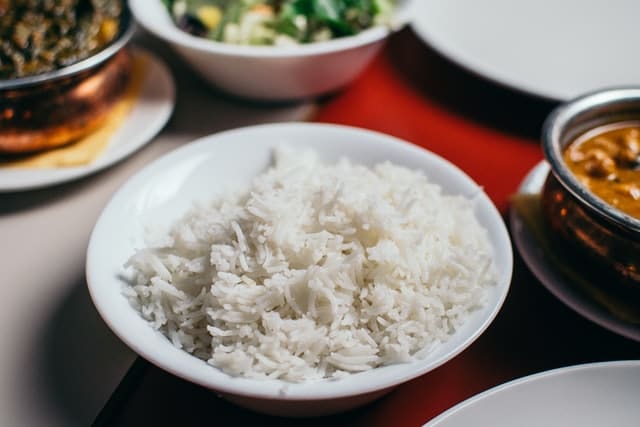Is Rice Good for Constipation? – Overview
Introduction
Constipation is a common digestive disorder characterized by three or fewer bowel movements per week or by stool that is hard, dry, or unpleasant to pass.
According to the National Digestive Diseases Association, most individuals have had constipation at some point in their life, which is generally caused by stress, nutrition, taking certain drugs, or ignoring the desire to defecate.
Possible Causes and Risk Factors
Constipation is a complicated complaint that happens when the stool travels too slowly through the large intestines, enabling the colon to remove more water and resulting in a hard stool.
Many factors, such as food, lifestyle, stress, and underlying health problems, can all play a role. Inadequate dietary fiber intake, for example, is one of its primary causes, as dietary fiber stimulates colonic motility and improves bowel movements.
People Who are Constipated May Have Symptoms of:
- Stools that are hard, dry, or lumpy
- Bowel movement pain and discomfort
- The feeling of being unable to empty the bowels
- Stools that resemble tiny stones or marbles
- Loss of appetite owing to a continuous sense of fullness
- Slightly bloated belly
Whole Grains and Refined Grains
Grains are the most frequent food group ingested by humans daily, and they are classified into two types: whole grains and refined grains. Brown rice, whole wheat, oats, rye, barley, maize, popcorn, buckwheat, quinoa, and sorghum are examples of whole grains, whereas white rice is an example of refined grain.
Because most whole grains are high in dietary fiber, they aid to improve bowel movements, expanding fecal weight, soften stools, regulating bowel motions, and alleviate constipation. However, refined grains are low in fiber.
Rice
Rice is a nutrient-dense grain that is widely available worldwide; some people eat it for breakfast, lunch, and dinner.
Rice is a fibrous grain that can help with bowel regularity and alleviate a range of bowel problems, such as constipation and diarrhea. Rice comes in two varieties: refined and unrefined, each with its own set of potential advantages for treating gastrointestinal issues.
Refined vs. Unrefined Rice
Refined rice, often known as white rice, is similar to brown rice with one major difference: the bran and germ have been removed. White rice becomes more soft and delicate as a result, and it breaks down faster during long cooking processes.
Brown rice is available in a variety of colors, including red, brown, and black. It is also known as whole-grain rice or unrefined (unprocessed) rice. Whole-grain rice offers a chewier texture and a nuttier taste, as well as more dietary fiber and essential nutrients, such as protein.
Adding a bowl of rice to your diet will help you obtain extra fiber. According to Japanese research, those who ate the most rice had a 41% decreased risk of constipation, possibly owing to the fiber in brown rice, which has 4 grams per cup compared to 1 in white rice.
Refined Rice Benefits
Refined rice (Whole-grain) is low in fiber because the bran, which contains most of the insoluble fiber, has been processed away.
White rice is considered a major food that causes constipation due to a lake of insoluble fibers, which encourages stools to move faster through your colon, reducing constipation.
Whole-grain rice is used mainly to help calm diarrhea, a symptom of irritable bowel syndrome, inflammatory bowel disease, and other disorders.
Brown rice Benefits
One cup of cooked brown rice provides 3.5 g of fiber, which accounts for 9.2 percent of an adult male’s entire daily requirement.
Almost all of this fiber is found in the rice’s outer shell, indicating the significance of whole-grain ingestion for constipation management.
Brown rice was found to successfully enhance bowel function by considerably lowering colonic transit time and increasing the number of bowel movements as compared to the white rice-based diet group.
Consequently, eating brown rice regularly will cause stool to flow faster through the colon, soften bowel movements, and therefore relieve constipation with more frequent and pleasant toilet visits.
How to deal with Constipation
Having frequent bowel movements is beneficial to a healthy body, even though addressing constipation may be embarrassing.
Laxatives may provide temporary relief for some individuals, but it is considerably easier to eat a nutritious fiber-rich diet, drink more liquids, and exercise regularly.
It is commonly recommended that people consume 20–25 g of dietary fiber each day to relieve constipation.
Dietary fiber is abundant in many meals, including grains like brown rice. Brown rice can help you get more fiber and relieve constipation if you eat it regularly.
Conclusion
Constipation is a common problem that is frequently caused by food and lifestyle. Certain meals can help increase the frequency of bowel motions. It’s interesting to compare and evaluate the impact of a rice-based diet on bowel motions.
To summarize, effective methods are needed to assist persons in consuming adequate dietary fiber from natural sources such as brown rice in their everyday lives to enhance their bowel movements, rather than fiber supplements isolated or manufactured from a specific natural meal.
See Also
Is Watermelon Good for Constipation
References
https://www.nature.com/articles/
https://www.livestrong.com/article/
https://pubmed.ncbi.nlm.nih.gov/

As a nutritionist, I research, find and experiment with recipes, natural diets and meal plans for weight loss, bodybuilding, and detoxing.
